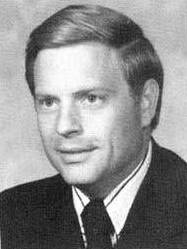Tom Ewing facts for kids
Quick facts for kids
Tom Ewing
|
|
|---|---|

official portrait, circa 1999
|
|
| Member of the U.S. House of Representatives from Illinois's 15th district |
|
| In office July 2, 1991 – January 3, 2001 |
|
| Preceded by | Ed Madigan |
| Succeeded by | Timothy V. Johnson |
| Member of the Illinois House of Representatives | |
| In office January 1975 – January 1991 |
|
| Preceded by | multi-member district |
| Succeeded by | E. Leslie Conkling |
| Constituency | 38th district (1975-1983) 87th district (1983-1991) |
| Personal details | |
| Born | September 19, 1935 Atlanta, Illinois, U.S. |
| Political party | Republican |
| Education | Millikin University (BS) UIC John Marshall Law School (JD) |
Thomas William Ewing (born September 19, 1935) is a former politician from Atlanta, Illinois. He was a member of the Republican Party. He served in both the Illinois House of Representatives and the United States House of Representatives.
Contents
Early Life and Education
Thomas Ewing grew up in Illinois. He earned a Bachelor of Science degree from Millikin University in Decatur, Illinois. He later received a law degree from John Marshall Law School in Chicago.
Ewing also served in the United States Army Reserve from 1957 to 1963. Before becoming a full-time politician, he worked as a lawyer. He was also an Assistant State's Attorney for Livingston County, Illinois.
Serving Illinois
Ewing was a member of the Illinois House of Representatives from 1974 to 1991. This is where he helped make laws for the state of Illinois.
During his time in the state house, he worked on committees that dealt with farming and state money. He was known for understanding how the state's money worked.
Serving in the U.S. Congress
In 1991, Ewing was elected to the United States House of Representatives. He represented the 15th district of Illinois. He won a special election to fill a seat that became empty. He served in Congress from July 2, 1991, until he retired on January 3, 2001.
In Congress, Ewing was considered a conservative. This means he generally believed in less government involvement and spending. He focused more on money matters than on social issues.
He served on important committees, including those for agriculture, transportation, and science. He led a special group that focused on helping farmers. Ewing also played a big part in helping the Republican Party gain more power in the House of Representatives in the mid-1990s. He supported a plan called the "Contract with America" which outlined goals for his party. In 1995, he became a "Deputy Republican House Whip," which meant he helped organize votes for his party.
In December 1998, Ewing voted in favor of the articles of impeachment against President Bill Clinton. He also helped Dennis Hastert become the new leader of the House Republicans in late 1998.
After Congress
After retiring from Congress in 2001, Ewing continued to work on important issues. From 2001 to 2007, he led a committee that worked to develop and produce renewable fuels, like those made from plants. This was a volunteer position.
He also served on boards for groups that focused on energy and trade. He helped an organization that worked to spread democratic ideas in other countries.
Ewing has received special honorary law degrees from several universities, including Lincoln College and Millikin University. He has also been recognized for his work in agriculture and leadership. He continues to work on ways to develop new energy sources that can help the country's economy and reduce the need for imported oil.
Family Life
Thomas Ewing is married to Connie, and they have six adult children.
 | Frances Mary Albrier |
 | Whitney Young |
 | Muhammad Ali |


